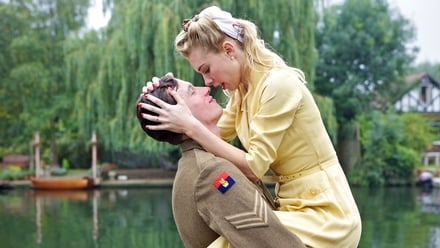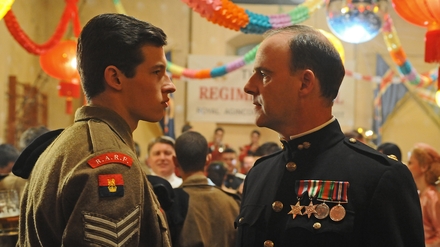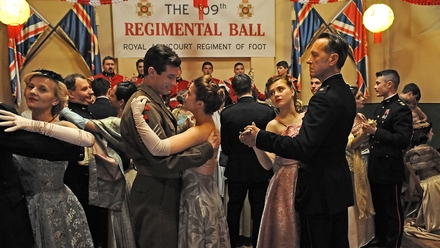With John Boorman's new film Queen & Country now screening at Dublin's Light House Cinema, TEN's Harry Guerin met the longtime Wicklow resident to find out more.
"Write what you know," as the maxim says, and for what he says will be his final film, John Boorman has adhered to that wisdom. It has served him well. His follow-up to the autobiographical 1987 film Hope and Glory has been a long, long time coming, but, from performances to the feelings it reawakens within, the wait has been worth it. How this touching film isn't receiving a bigger release in Boorman's adopted country - Pat Shortt and Brían F O'Byrne are in it - is a mystery.
Nine years on from Hope and Glory, Boorman's alter-ego Bill Rohan (Callum Turner) is now 18 and trudging through the reality of desk-bound army life for his National Service. Saved from a posting in Korea, Bill is the typing instructor in a camp where he works and lives with Percy Hapgood (Caleb Landry Jones), a trouble magnet determined to push his superiors to the brink. And then some.
The duo are fighting wars on a number of fronts: boredom, petty mindedness and, most importantly, matters of the heart. They're kids waiting to be men and the army could be the making of them, although not in the way the top brass would like to think. Read our full review here.
Harry Guerin: What was it about Callum Turner that when you saw him you knew he was the actor to play your alter-ego, Bill Rohan, in Queen & Country?
John Boorman: I interviewed a lot of boys. When you're doing something like this involving very young boys and girls, by definition, they're not going to have much experience. There's not much you can see other than talking to them and auditioning, which I did a lot of. This boy, what I liked about him [was] he had a presence. The role of Bill is very much the kind of observer. What was his face like in repose - when he's just watching - was important. And secondly, I wanted him to look like the boy in Hope and Glory, to look like he'd grown up to be that person. They had a similar look.
Were there any shivers down the spine when you saw him?
No [laughs]. It's a funny thing; when I'm shooting a film I'm quite objective. There were only two places where I got the shivers. One was when David Thewlis [who plays Sergeant Major Bradley] came in. He was so much like [the real person] that every time he got on the set I got a little shaky. And the other scene was the one with my mother [played by Sinéad Cusack], when she's been waving at her ex-lover and Bill says: 'Do I betray my mother or do I betray my father?' That hit me hard.
You know, when I was writing it, and also when I was shooting it, every scene I would ask myself the same question which was, 'Is it true - does it feel true?'. That was always the guiding principle.
Why did you wait so long from Hope and Glory to make Queen and Country?
Well, I always had in mind to do it, but then other things intervened. It was only recently - last two or three years - when I looked back and it had become history, really. Sixty years ago - it was history.
So much came out of that period, it seemed to gather importance. The Coronation of the Queen, of course, but also that Labour government after the war, they did two things. They founded the National Health Service and they also founded the secondary 'Modern Schools'. And for the first time every child learned something about music and art, whereas before at 11 you either went to 'Grammar School' or you learnt a craft. And it was out of that . . . Those kids in the Fifties grew up to be The Rolling Stones, The Beatles and the whole art explosion of the Sixties in London. So it was a transforming time, really.
Was the army base even grubbier in real life than it is on screen?
It was almost exactly as it was! I had the opportunity to reproduce that camp exactly as I remembered it. We built it in Romania - built all the sets there - and I was able to build it from memory.

You've talked about how your actual memories of the events depicted in Queen and Country and Hope and Glory have now been replaced by what you've filmed. Why do you think that happens?
Well, I think the relationship between memory and imagination is kind of mysterious. If you tell me a story about something that happened you on the way to work this morning, you're already applying imagination to memory because you're making it into a story. So that process is going on the whole time with all of us. I just had the privilege of putting mine into a movie!
Did the army in any way help with the career you ultimately chose, be it in terms of discipline, dealing with people or whatever?
Well, at that time I didn't have any idea about being a film director. My whole career really developed organically by accident or growth. That boy swimming in the river at the beginning of Queen & Country? His ambition was to become a clapper[board] loader. I applied to the studios to become a clapper loader and I couldn't get the job.
So when I came out of the army I was writing and I was also doing radio broadcasting - when I was 17/18 I did a lot. I did a whole series of interviews around the studios of technicians and their jobs. I eventually got a job as a trainee assistant film editor, and I thought that I would be very happy to be a film editor as a career. It was perfect.
So what happened next?
It was a period when everything was expanding - commercial television was setting up - so I was editing documentaries and one day the director fell over and broke his leg or something and so I had to go out and do it. From that point I kept directing my documentaries as well as editing them. They got longer and bigger and then I got frustrated by the limitations of documentaries so I started to dramatise. And then I was making drama films for the BBC. Then I started getting offers to make movies. It was just one thing led to another.
 A scene from Queen and Country
A scene from Queen and Country
What happened to the real Percy from Queen & Country?
You know, I lost touch with him. He had an affair with my sister and it lasted a couple of years. When they broke up he rather disappeared from our lives and I don't know what became of him, really. I made attempts to reach him but I never did.
You've said this will be your last film. If you were a younger man, would all the TV opportunities for directors now on HBO, Netflix etc excite you?
Yes, but I still feel the two-hour movie is the highest form, really. Everything has to be compressed and it's more like writing a poem than writing a novel. It's what you leave out is so very important as what you leave in. Like in this film, all the themes are below the surface. The surface is very naturalistic, but what lies underneath . . .
What films have excited you of late?
I really liked the films that were nominated as Best Foreign Film this year [at the Oscars]. Ida was the one that won it - about the girl who was going to be a nun – wonderful. And then there was also Timbuktu, which was a terrific picture; and Leviathan, the Russian picture. And then Wild Tales, which was one of the funniest films I've ever seen in my life. They were head and shoulders above all the American movies that were nominated for Best Picture.
It's easy to become downhearted about the blockbuster stuff trampling all over great little films that just won't get the run in cinemas - or the audiences.
It's a big problem now. The independent films are very hard to finance - very hard to get more than $3 million or $4 million to make an independent film - and so it restricts their scope a lot. And then you have the studio pictures, which are the superhero pictures.
It's amazing; every year there's always a few really good films that get made somehow or other. And nearly always when you see a really good film, nearly all of them have a history of great difficulty in getting them made and finding the money!
Do you think the business has become tougher, or was it always a tough business?
I've been making films for 50 years, half a century, and the film industry has always been in crisis. Not the same crisis, but it's always in crisis! But somehow films get made, and now and again there's a good one!
What would you like people to take from Queen & Country?
I'd like them to feel they were transported into another time, and that it was convincing and touching.
It's all of those.


